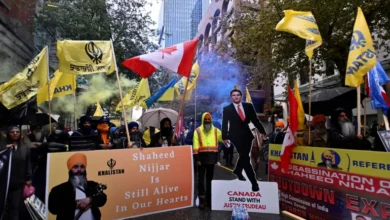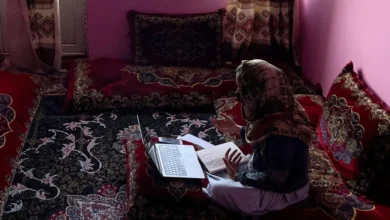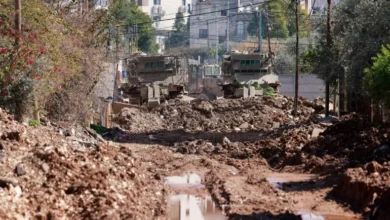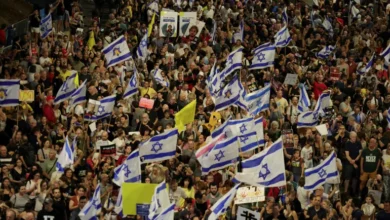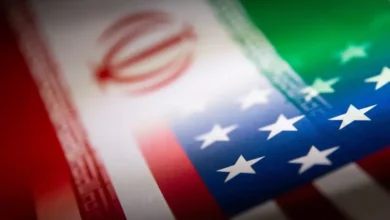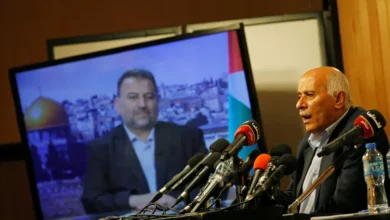Africa must challenge the West’s colonial game plan for Palestine
Tafi Mhaka
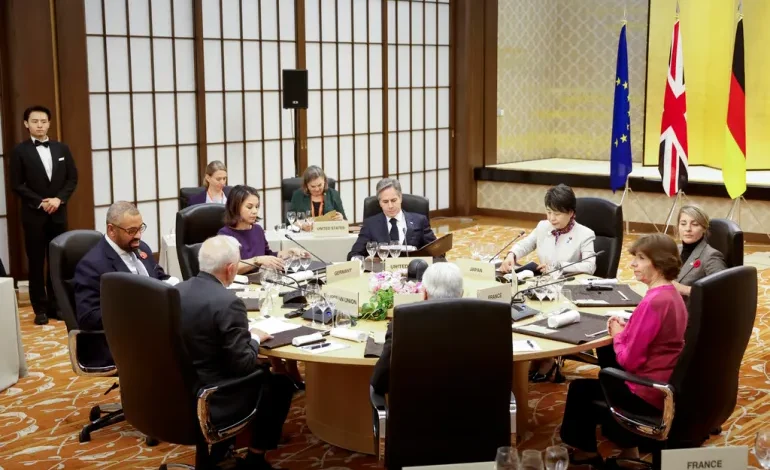
After a two-day meeting of foreign ministers from the wealthy Group of Seven (G7) countries in the Japanese capital, Tokyo, in early November, US Secretary of State Antony Blinken announced that the Palestinian resistance movement Hamas would no longer be allowed to rule Gaza.
“Israel has repeatedly told us that there’s no going back to October 6 before the barbaric attacks by Hamas,” Blinken said, adding that Gaza – besieged and separated from the rest of the occupied Palestinian territory – should eventually be unified with the West Bank but only “under the Palestinian Authority”.
Hence, the G7 nations – the United States, Canada, Japan, the United Kingdom, France, Germany and Italy – plus the European Union seemingly ignored what the rest of the world and, most importantly Palestinians in Gaza and elsewhere, may think or want and singlehandedly decided that Hamas is effectively over and Palestine after this war will be shaped according to the wishes of Israel.
As an African, I find it extremely condescending and disturbing that the world’s leading former colonial powers sat around a small table in Tokyo and developed a provisional blueprint for the sociopolitical future of Palestine, all without a clear mandate or significant input from the Palestinians.
And I couldn’t help but notice the dubious convention in Tokyo bore a striking resemblance to the infamous Berlin Conference of 1884-1885, where Western powers met to stake their illegal claims to African territories.
Even though one of the Berlin Conference’s alleged aims was to consider the interests of the Indigenous populations, Otto von Bismarck, the first chancellor of the German empire, did not invite Africans to the 104-day-long conference.
To my mind, the G7’s exclusive rendezvous in Tokyo was Gaza’s umpteenth Berlin 1884 moment in the past seven decades.
Why can Palestinians not exercise their democratic right to choose a government of their liking? Why does the G7 get to impose a new political arrangement and dispensation that will specifically exclude Hamas? Is democracy in Palestine only synonymous with the West’s (and Israel’s) demands?
To be clear, Blinken – the highest ranking diplomat of a country that has waged countless bloody wars across the world in the name of “democracy” and “human rights” – did not mention anything at all in this meeting, which included zero Palestinian representatives, about Palestinian self-determination. He did not make any plans to aid the surviving inhabitants of the besieged enclave, to hold a referendum on Gaza’s political future or put forward a roadmap for them to hold democratic elections to choose a post-war leadership of their liking.Far from establishing a viable peace in Gaza and the West Bank, the G7 countries want to obliterate the will of the Palestinian people, clearly in the vain hope it would facilitate a problematic return to an Israeli-friendly dispensation under Palestinian Authority President Mahmoud Abbas, a deeply unpopular and ineffective leader who has long been eager to “cooperate” with Israel to keep his government in power and the Palestinian resistance to apartheid and occupation in check.
Hamas has been governing Gaza since it defeated Abbas’s Fatah party in the January 2006 parliamentary elections. Since then, the Western countries conspired to topple the Hamas government and return Gaza to PA control at least one other time.
In 2006, then-US President George W Bush and his secretary of state, Condoleezza Rice, reportedly approved a clandestine plan for Abbas’s Fatah party to overthrow the Hamas government in Gaza. In the event the plot failed, the Bush administration had set aside $1.27bn over five years to train 4,700 new Fatah troops that would try to disrupt and eventually oust the democratically elected government of Gaza.
Although these plans failed and are now widely condemned as illegal, immoral and counterproductive, today the US and its powerful allies once again appear determined to get rid of Hamas and put the entirety of the occupied Palestinian territories under a docile, Israel-friendly puppet government.
This should not be allowed. Forcing Palestinians under the authority of a government that is only Palestinian in name and that is propped up by and indebted to colonial powers will not achieve sustainable peace or deliver justice.
As Africans, we know such neocolonial puppet governments either swiftly fail and trigger renewed bloodshed or remain in power for a prolonged time through violence, oppression and outside support while turning the land they govern in the name of their colonial masters into a swamp of corruption, human rights abuses, extreme poverty and widespread unemployment – a swamp that takes consequent national government years, if not decades, to fully clean up.
I lived through the first scenario myself.
I was born in Rhodesia, a white settler colonial state in Southern Africa (present-day Zimbabwe), where Africans were discriminated against and had only a few, very limited land, socioeconomic, political and human rights.
Like most countries on our beautiful continent, freedom was not handed to us Zimbabweans on a silver platter. Thousands of men and women fought and died in the 1896-1897 First Chimurenga and the 1964-1979 Second Chimurenga (revolutionary liberation wars).
The nationalist successes in the Second Chimurenga and growing international pressure for a political resolution to the conflict led to the formation of a new Black government of supposed moderate African nationalist Bishop Abel T Muzorewa.
Rhodesia-Zimbabwe, however, was still a country controlled not by its Indigenous inhabitants but white settlers. It’s short-lived constitution allowed the settlers to retain their ill-gotten farms and make all important government appointments and promotions. Muzorewa and his Black cabinet ministers were nothing but eloquent and well-educated political stooges who served to protect white supremacy and impede Zimbabweans’ 89-year struggle for land and independence.
The people refused to support the puppet administration, and the Patriotic Front, a guerrilla alliance waging an armed struggle against settlers, continued its fight for a fully independent country.
The Organization of African Unity, the predecessor to the African Union, also refused to recognise Muzorewa’s government.
The settlers’ nefarious plans to co-opt a few Black moderate political elites and rule through a toothless front fell flat within a year, and Zimbabwe gained its independence in April 1980.
Elsewhere in Africa, some puppet regimes did endure, unfortunately.
In January 1960, France successfully installed a neocolonial government in Cameroon under Ahmadou Ahidjo, the West African country’s founding president. As a consequence of a cooperation agreement signed by Ahidjo and then-French President Charles de Gaulle on December 26 1959, France had control over Cameroon’s political, economic and sociocultural direction. It also provided Cameroon with the CFA franc, a currency guaranteed by France and pegged initially to the French franc and then to the euro, and continued exploiting Cameroon’s strategic raw materials. French advisers even had the authority to overrule Cameroonian ministers on crucial policy decisions. Cameroon was effectively rendered a French imperial outpost, and Ahidjo went along with it. It gained independence in 1960, but the principal beneficiaries of its freedom were the French treasury, French politicians, French businesses, and everyday Frenchmen and -women. To this day, Cameroon is still working to free itself fully from the suffocating grasp of its former colonial ruler.
As demonstrated in Zimbabwe, Cameroon and many other African countries, puppet regimes are a certain recipe for disaster.
It would be a colossal mistake to allow the West to get its way in Palestine and ensure that all of the occupied Palestinian territories are ruled by a puppet regime like that of Abbas, which in the end serves only the Israeli state, which keeps it in power.
Sustainable peace in the region can be secured only after the formation of an independent Palestinian state along the 1967 borders and nothing less.
Just like us Africans did some decades ago when we were living under colonial occupation, Palestinians today have the right to resist Israel in anyway they see fit and to choose their own political leaders, be they from Hamas, Fatah or any other political organisation. African countries and the African Union should oppose and not recognise any political dispensation or roadmap that smothers the democratic will of the Palestinian people.
As Israel makes clear its plans after the end of this war to occupy Gaza for an indefinite time, expand its illegal settlement enterprise in the West Bank and continue to deny the Palestinian right to self-determination, African states, which know such colonial abuse well, should not stand idly by.
They must sever diplomatic ties with Israel and pressure it to follow international law.
The time is ripe for the end of Western colonisation in Palestine, and Africa must do its part to put things right.
